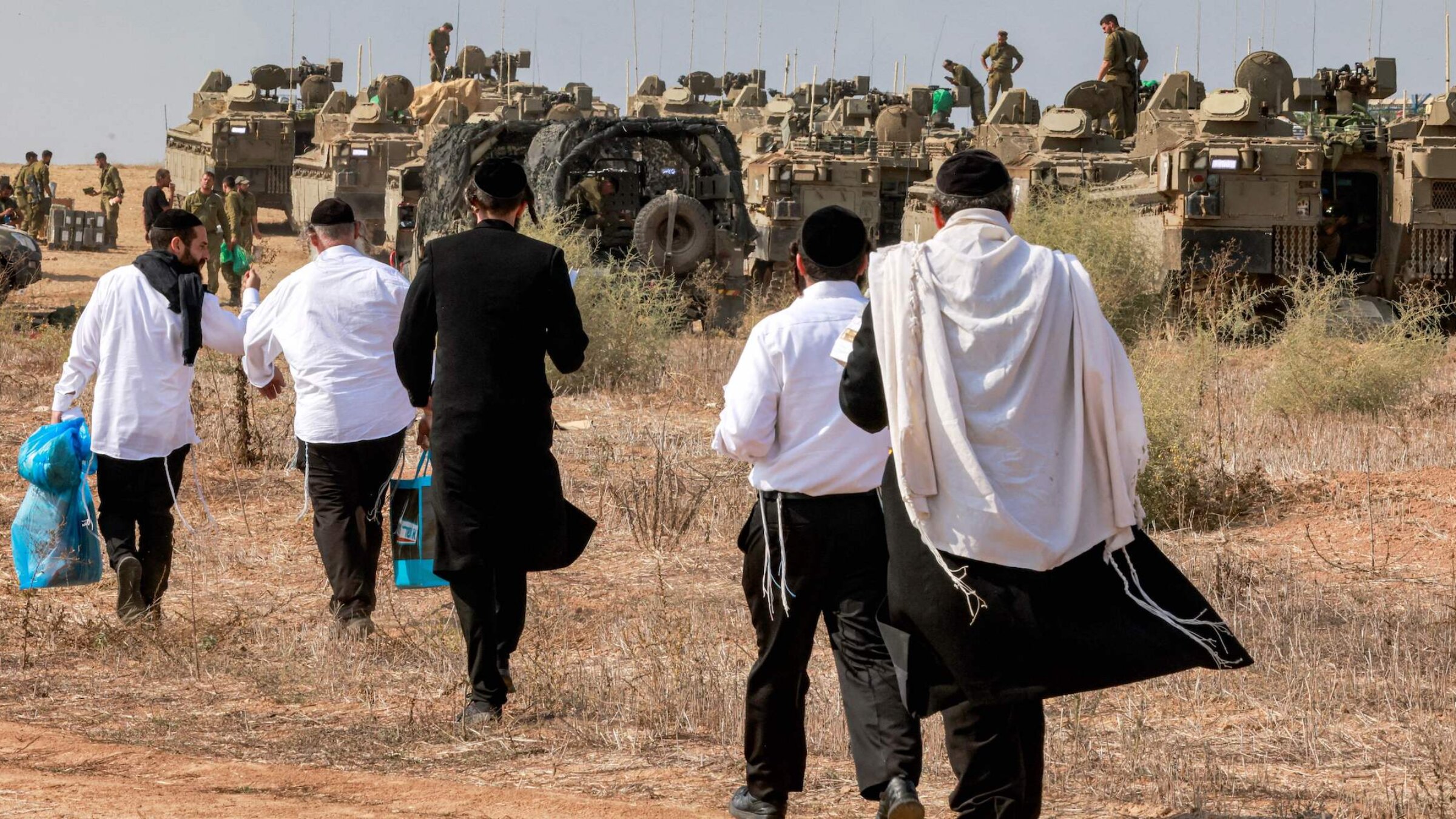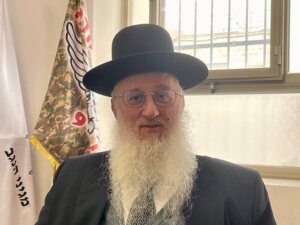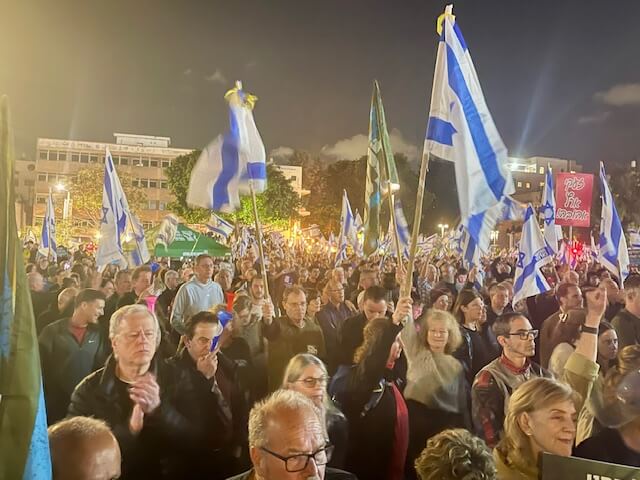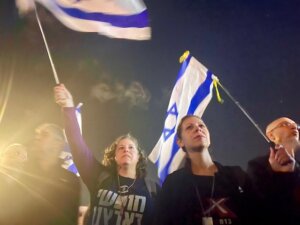Haredi ‘lost boys’ may find themselves drafted into Israel’s army
Netanyahu’s government is in jeopardy over the military exemption for yeshiva students

Haredi Jews visit Israeli soldiers to show their support as they deploy at a position near the border with Gaza in Southern Israel on Oct. 11. Photo by Menahem Kahana/AFP via Getty Images
Editor’s note: Israel’s Supreme Court has ruled that ultra-Orthodox students must be drafted into the military, so we’re republishing this story about the potential impact of this change.
JERUSALEM — There are chairs in the stacks and in quiet corners of this city’s libraries where some young Haredi men spend days on end, skipping out on their required Torah study with access to free Wi-Fi and little chance that anyone they know will spot them.
They can stream Tupac Shakur songs while flipping through magazines, as one was doing in the central branch when I met him earlier this month. Or play chess online with a stranger in South Africa, as I saw one doing in Neve Yaakov in February. He told me he learned to play from a library book, and also reads all he can about space and evolution.
I asked where he was supposed to be. “Officially? At yeshiva studying, of course,” he said. “But this is my real beit midrash.”
Haredi communities worldwide expect their young, unmarried men to devote themselves to rigorous Torah learning and a pious way of life that typically precludes, among other things, gangsta rap and Darwinism. But the public policy stakes are higher in Israel, where studying at a yeshiva at least 45 hours a week — or claiming that you’re doing so — is subsidized by the government and exempts a young Haredi man from mandatory military service.
The loophole dates to the founding of the modern state of Israel in 1948, and has rankled those required to serve for decades. But frustration has spiked since Oct. 7, given the mass call-up of reservists and months of military casualties, and now threatens to unravel Prime Minister Benjamin Netanyahu’s governing coalition, which includes Haredi parties as well as ultranationalists opposed to their special treatment.
With the exemption set to expire this Sunday, many Israelis — some within the Haredi community included — want the government to start recruiting the young men who, like those at the libraries, are falling short of the law’s expectations.
How many Israelis could this affect?
The Jerusalem-based Haredi Institute for Public Affairs says those “lost boys,” as they’re sometimes called, make up at 15% to 20% of the estimated 66,000 Haredi Jewish men of draft age (between 18 and 26). The Israel Democracy Institute, a research group that has spent years studying the Haredi exemption, puts the number between 30% and 40%, or more than 20,000.
“Israel needs soldiers, not reluctant yeshiva bochers,” said Eli Levin, an engineering consultant who is secular and joined thousands of demonstrators rallying in Tel Aviv earlier this month to end the blanket draft exemption. “The government should at least target Haredi guys who aren’t really studying Torah.”
Why is there a Haredi draft exemption?
Israel’s founding leader, David Ben-Gurion, agreed to exempt yeshiva boys from military service as part of a deal to secure political support from Haredi leaders. Back then, the community comprised 1% of the new country’s population of about 800,000, so the exemption included about 400 young men.
Haredim now make up 13% of the country’s more than 9 million citizens, and most see the exemption as an essential precondition of life in modern Israel. They believe full-time Torah study — not the Israel Defense Forces — is what actually protects the Jewish people and nation by fulfilling God’s will. Torah learning, they say, is their way of achieving arvus, or collective responsibility for all Jews, just as military service does for other Israelis.

“Nobody’s going to say we don’t need an army,” said Rabbi Tzvi Klebanow, president of Nahal Haredi, a nonprofit that supports Haredi soldiers. “But the army needs to understand that there’s a connection between military success and the will of Hashem. If the army succeeds, it’s because of Hashem. Through Hashem’s spirit we’ll be successful.”
More practically, the draft exemption is a way to keep Haredi young men cloistered in their communities, without exposure to Israel’s mixed-gender army or as much temptation to leave Haredi life after serving.
“We will die and not be drafted,” goes the mantra of Haredi activists who recently have taken to blocking intersections in support of preserving their exemption.
Israeli men over age 18 are generally required to serve 32 months and women 24 months. Many Palestinian citizens, Orthodox women, and a handful of conscientious objectors do civilian national service instead. The number of Haredim doing national service, according to IDI data, grew to more than 3,000 in 2o17 from about 300 a decade before.
The current crisis comes after some 20 years of political debate and legal challenges over the Haredi exemption, during which a growing but still small number of Haredi men have gone into the IDF, often facing backlash and bullying in their communities. The military counted 730 Haredi soldiers in 2009, and 1,185 in 2021; thousands tried to enlist after the Hamas terror attack on Oct. 7, though the IDF only accepted a fraction of them.
The IDF spokesperson’s office did not respond to repeated requests over the past two weeks for interviews for this article.
How do Israelis feel about this exemption?
Critics of the draft exemption have spent decades arguing in the Knesset and courts that it’s unfair that yeshiva bochers don’t share the burden of defending the country. They’ve also argued that keeping so-called “lost boys” in state-funded yeshivas in hopes they’ll mature, marry and someday fall in line with Torah-study expectations is not the government’s responsibility.
“Secular society is not willing to accept this informal agreement,” said Asaf Malchi, a senior researcher at the IDI who studies Haredim in Israel and the nexus between military and society. “They’re getting money from the state to advance their culture, but there’s not a social contract agreeing to subsidize this.”
The draft debate is part of larger tensions over government subsidies for Israel’s Haredim, nearly half of whom live below the poverty line and rely on welfare payments totalling about $2.6 billion a year, according to the IDI. They generally have large families — the average birth rate per Haredi woman is 6.5, more than double the overall Israeli average — yet many of the men study rather than work for most of their lives, and the IDI estimates that adult yeshivas, known as kolels, get about $1.7 billion a year from the government.

Twice since 1998, civil libertarians have managed to convince Israel’s High Court that the Haredi draft exemption violates the right of the majority to equal treatment under the law. Yet the policy has essentially stayed in place as one government after another promised, but failed to pass, a military draft scheme that would motivate Haredim to join the army without coercion.
What’s the history of this case?
Netanhayu’s government committed in June to address the situation by March 31, when the High Court’s latest extension of the exemption is set to expire. The issue was tied to the right-wing government’s efforts last year to overhaul the judiciary. Netanyahu — whose coalition depends on two Haredi parties that control 17 of the Knesset’s 120 seats — was expected to extend the exemption indefinitely while also protecting it from future court challenges by codifying Torah study as a core value of the state.
Then came Oct. 7, when Hamas’ attack on Israel triggered the largest military mobilization in the country’s history, with a call-up of 300,000 reservists. The toll has already been the heaviest since the first Lebanon War in the 1980s, with 600 Israeli soldiers killed and about 3,150 wounded. Plans for a prolonged IDF presence there and the potential for a full-blown war with Hezbollah in Lebanon have prompted the government to consider extending the amount of time conscripts and reservists must serve and have brought resentment over the Haredi exemption to an all-time high.
An IDI survey published earlier this month showed 70% of Israeli Jews want to end the Torah-study exemption, up from 60% in 2018. Notably, nearly 20% of Haredim polled in the February survey supported changing the policy.
How could this affect Netanyahu’s government?
Critics of the exemption include Defense Minister Yoav Gallant, a key architect of the Gaza operation, and National Unity Party Leader Benny Gantz — both among the five members of Netanyahu’s war cabinet.
Netanyahu’s dependence on Haredi support to stay in power makes it unlikely he’ll agree to lift the exemption and effectively allow the army to start recruiting yeshiva boys on April 1. Because yeshivas rely on government funding based on their enrollment, such a move could gut their budgets practically overnight, a prospect that Gilad Malach, director of IDI’s Ultra-Orthodox in Israel program and a lecturer at Bar-Ilan University, said that “Haredi politicians couldn’t tolerate.”
Netanyahu’s camp at first proposed a plan to extend the draft exemption for Haredim by raising the age at which they could still be drafted from 26 to 35, effectively pushing them to stay in yeshivas for an extra nine more years if they want to continue avoiding military service.
Gallant said Sunday that he didn’t support the proposal. Gantz, meanwhile, threatened to leave the coalition if it passed, causing Netanyahu to backtrack. His revised plan calls for gradual annual increases in the number of Haredim doing military service, but not through quotas nor through ending the blanket exemption.
Policy analysts and even some Haredi rabbis and community leaders I spoke with expect the only compromise capable of passing during wartime would entail recruiting draft-age Haredi men who aren’t studying Torah full time, like those lost boys in Jerusalem’s libraries. Such a law, they said, would have to address the many reasons these young men are ducking Torah study.
Why some yeshiva bochers drop out
Rabbi Klebanow, who heads the group that supports Haredi soldiers, told me that some doubt its importance, or are questioning their religious faith overall. Some also have undiagnosed learning disabilities or cognitive challenges that make sitting 12 hours a day intensively studying Torah, as required in most yeshivas, too difficult.

Many, he said, want to get jobs because their families are poor. And some are simply distracted by popular culture, digital media, drugs or sex.
An untold number of lost boys drop out of yeshivas and their communities altogether, yet aren’t allowed to hold tax-paying jobs, pursue secular academic study or get vocational training because doing so would cost them their military exemptions. Those requirements, some rabbis and educators told me, push many to work on the black market, including selling drugs.
Others are officially enrolled in mainstream yeshivas, but don’t put in the 45 hours of Torah learning required per week — or, in some cases, study at all. And some attend what are called “light,” “soft” or “dropout” yeshivas that, with or without government approval, expect less than 45 hours of study.
Several of these yeshivas — derided, too, as “places for bums” — offer much-needed vocational training or basic academics their students lack because Haredi boys often stop general studies around 8th grade to focus on Talmud full time.
‘Glorified babysitting services’
Rabbi Mordechai Kornfeld, who works with Nahal Haredi, said some of these light yeshivas are in fact “glorified babysitting services.” He and other rabbis told me that Israel’s education ministry, which helps fund the yeshivas, and the IDF don’t do much to monitor or regulate them. Some said they know of yeshivas that are gaming the system to keep government money rolling in.
Israel’s Channel 12 News ran an investigation earlier this month detailing schemes in which certain bogus yeshivas that don’t really exist sell young men certificates vouching that they are attending full-time Torah study. Those operations pocket half the money the government gives them per student and kick back the rest to their so-called students, the station reported.
“We know that there is this phenomenon, but we can’t measure it,” Malach, the researcher at the IDI, told me. “It’s a secret. It’s a scam. Like black money.”
Officials at the education and defense departments did not respond to several inquiries for comment over the last week.
Haredi leaders universally insist that serious Torah learners should continue being exempted from the draft. But a growing chorus of them support conscription for those who are not actually studying 45 hours a week.
Several have increasingly urged their followers to give more respect to so-called kosher balabos — men who have jobs rather than spending their days in a kolel, or adult house of learning. And some have also said that Haredi young men who are not regularly attending a yeshiva — especially those who work for money, study in a regular university or use social media or smart phones — should be drafted, arguing that these activities undermine the community’s case for draft exemption.

But while the calls for ending the exemption have grown louder, the IDF itself has a history of not being so eager to embrace a flood of new Haredi recruits.
What’s the IDF’s position on Haredi men and the draft?
Haredi leaders have long complained that most of the programs the IDF has launched over the years have not done enough to ensure their soldiers continue to study Torah at least part time, observe Shabbat and kashrut, and stay away from female soldiers and instructors.
The military has recently experimented with having Haredi men work in all-male units specializing in airplane maintenance and military technology. But the IDF has not brought to scale those programs, nor Nahal Haredi’s program that has created segregated combat units for Haredim, with their own rabbis embedded to assure what they call a “sterile environment.”
Eli Paley of the Haredi Institute for Public Affairs said the military “mindset” has been that “it doesn’t really need Haredi or even want them because accommodating them will require some changes the army is not ready to do, so please don’t bother us.”
That mindset became embarrassingly clear in 2019 when the IDF, under pressure to meet a law that set a quota for Haredi troops, was exposed for jacking up the number of those soldiers. A similar situation unfolded last fall, when all but 584 of the 4,000 Haredi men reported to have raised their hands as the Gaza war began were rejected for reasons the IDF has not yet explained.
Several rabbis told me that it would be a mistake, especially during wartime, to frame the draft exemption solely as something Haredim want and the rest of the public opposes. And it would be a disservice to both the Jewish state and the Jewish faith, the rabbis of Nahal Haredi emphasized, to give up on lost boys.
“If the choice for these kids is hanging out on the streets and being extremely, extremely frustrated,” Kornfeld said, “or serving their country as soldiers or in other public service while building themselves to be successful citizens, there’s no question what path they should take. You can’t have a connection to God if you feel like a failure.”






















